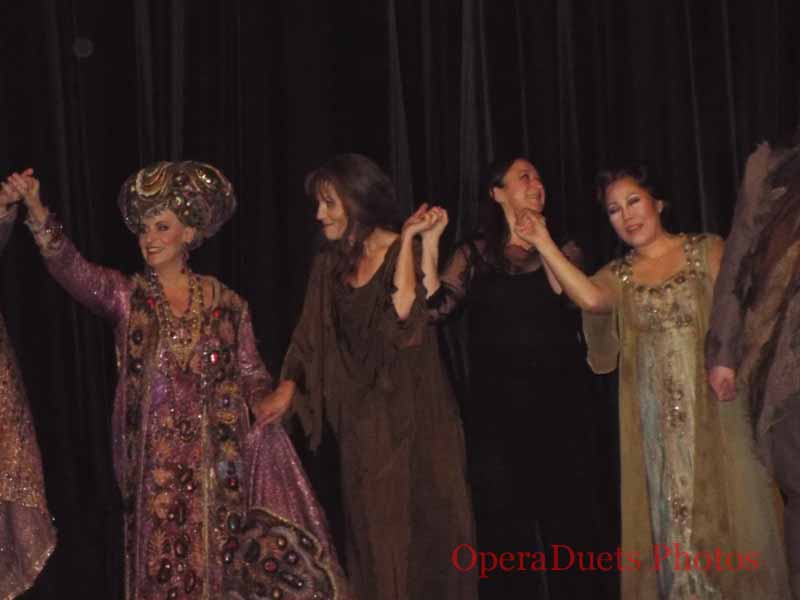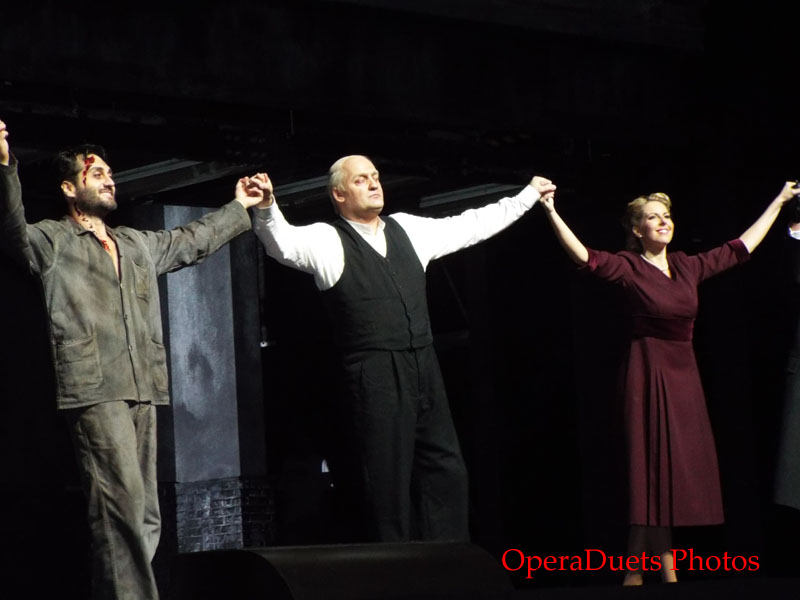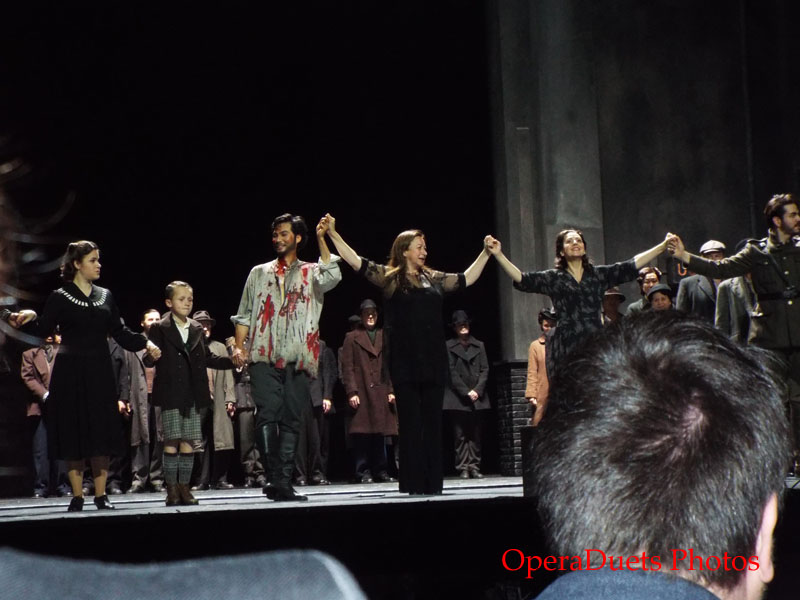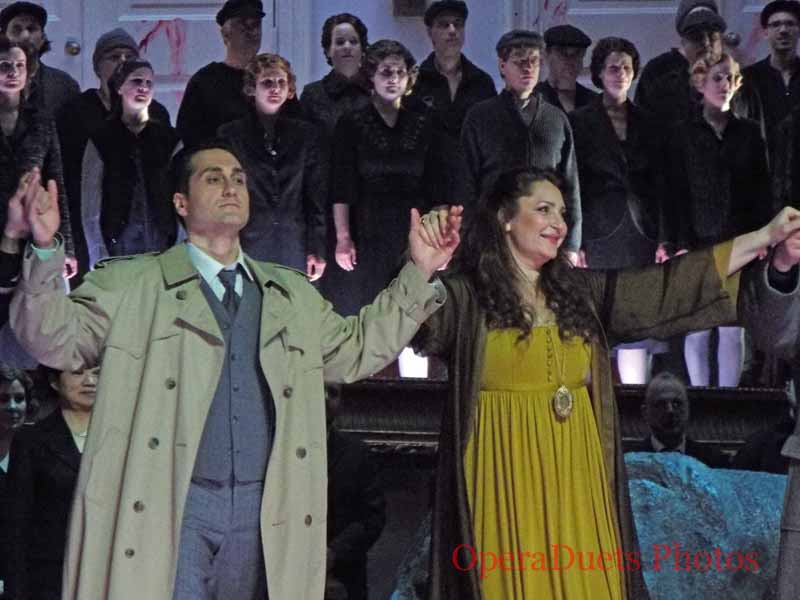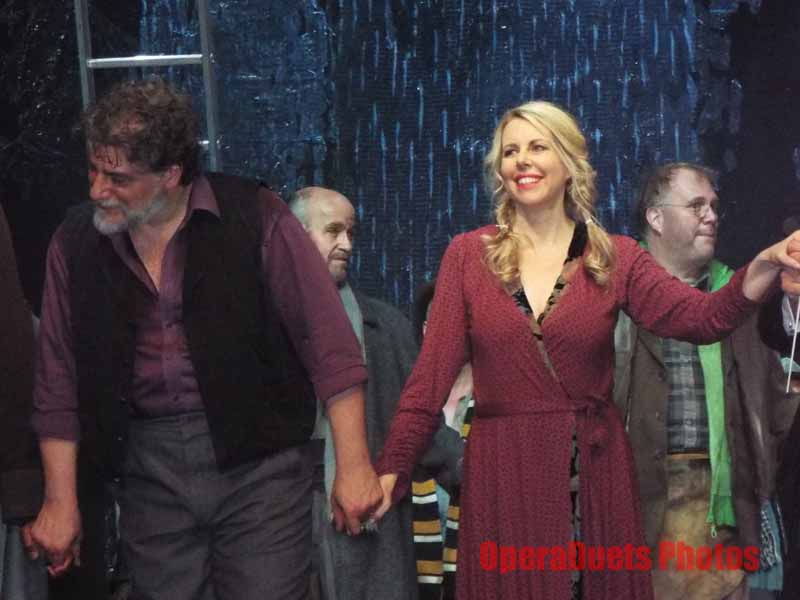2003-02-23 I Pagliacci (R. Leoncavallo), Hamburgische Staatsoper
Canio / Bajazzo = José Cura
Nedda / Colombina = Hellen Kwon
Tonio / Taddeo = Ko Seng Hyoun
Beppe / Harlequin = Peter Galliard
Silvio = George Petean
ZWEI BAUERN
Peter Veit
Steven Dom Glfford
Niksa Bareza, conductor
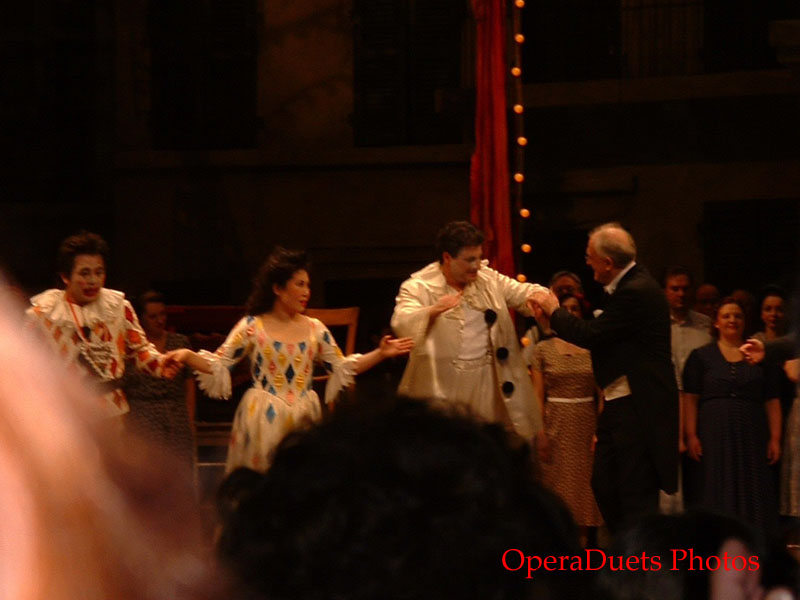
INSZENIERUNG Gian-Carlo
dei Monaco
BÜHNENBILD UND KOSTÜME
Michael Scott
CHOR
Florian Csizmadia
HAMBURGER ALSTERSPATZEN
Jürgen Luhn
SPIELLEITUNG
Thomas Mittmann
Beginn 19.30 Uhr Ende gegen 22.30 Uhr Pause von
ca. 30 Minuten nach »Cavalleria rusticana«
049. Vorstellung seit der Premiere am 28. Januar 1988
José Cura sings Pagliaccio (Canio)
Seng Hyoun Ko was an amazing Tonio. Hellen Kwon weak-voiced, but good actor. George Petean was OK as Silvio. Peter Galliard was a good Beppe.
José Cura was at times a brilliant Canio, I am sure that he will sing on February 25 much better. Premiere nerves, after conducting Cav (tired), and very cold weather in Hamburg.
OD Travel + photos
Friday, February 23, 2018
February 23, 2003: Pagliacci in Hamburg
Posted by
operaduets
at
Friday, February 23, 2018
0
comments
![]()
Labels: 02_February, 02-23, 2003, Germany, Hamburg, Hellen Kwon, José Cura, Ko Seng Hyon, Opera, PAGLIACCI, RUGGERO LEONCAVALLO
February 23, 2003: Cavalleria Rusticana in Hamburg
2003-02-23 Cavalleria Rusticana (P. Mascagni), Hamburgische Staatsoper
Santuzza = Ildiko Komlosi
Turriddu = Kristjan Johansson
Alfio = Ko Seng Hyoun
Lucia = Olive Fredricks
Lola = Antigone Papoulkas
José Cura, conductor
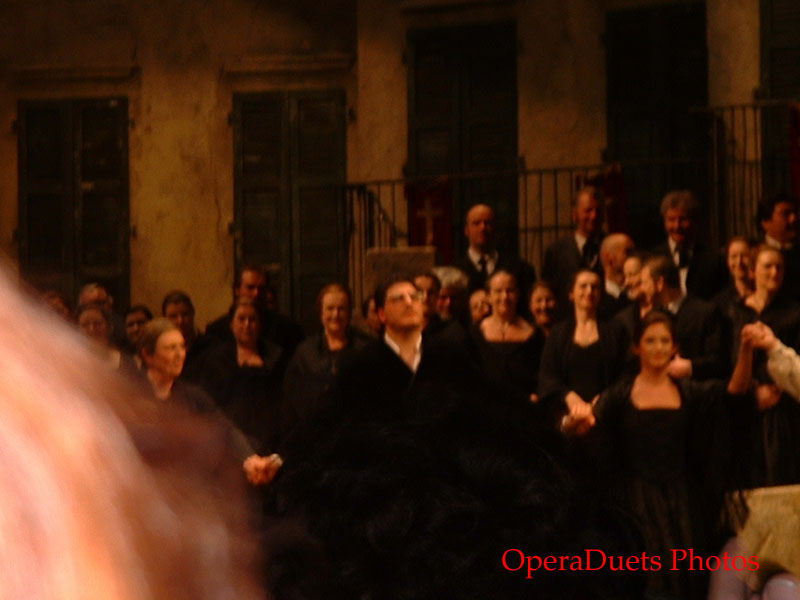
049. Vorstellung seit der Premiere am 28. Januar 1988
INSZENIERUNG Gian-Carlo
dei Monaco
BÜHNENBILD UND KOSTÜME
Michael Scott
CHOR
Florian Csizmadia
HAMBURGER ALSTERSPATZEN
Jürgen Luhn
SPIELLEITUNG
Thomas Mittmann
Beginn 19.30 Uhr Ende gegen 22.30 Uhr Pause von
ca. 30 Minuten nach »Cavalleria rusticana«
TURIDDU
Kristjan Johannsson
(Für den erkränkten Attila B.Kiss)
José Cura conducts Cavalleria Rusticana
I really liked this production (Gian Carlo del Monaco) Ildiko Komlosi was wonderful as Santuzza. Kristjan Johannsson was OK as Turriddu (if only José Cura had sung it instead, what about, Cura conducts and sings Turriddu at the same time, somebody else acts Turriddu). Seng Hyoun Ko was wonderful as Alfio. Olive Fredricks was great as Mamma Lucia. Antigone Papoulkas was OK as Lola.
I think Cura was doing OK as a conductor, hard for me to say.
OD Travel + photos
Posted by
operaduets
at
Friday, February 23, 2018
0
comments
![]()
Labels: 02_February, 02-23, 2003, CAVALLERIA RUSTICANA, Germany, Hamburg, Ildiko Komlosi, José Cura, Kristjan Johansson, Opera, PIETRO MASCAGNI
Thursday, February 22, 2018
February 22, 2003: Eugen Onegin in Hamburg
2003-02-22 Eugen Onegin (P. Tsjaikovskij), Hamburgische Staatsoper
Larina = Renate Spingier
Tatiana = Danielle Halbwachs
Olga = Elena Zhidkova
Filipjewna = Kat ja Pieweck
Eugen Onegin = Jean-Luc Chaignaud
Vladimir Lenski = Piotr Beczala
Fürst Gremin = Simon Yang
Saretzki = Jörn Schümann
Triquet = Frieder Stricker
Friedemann Layer, conductor
Peter Tsjaikovskij
EUGEN ONEGIN
22. February 2003 19:30
Chor:
Florian Csizmadia
Conductor:
Friedemann Layer,
for the sick Lothar Koenigs
VORSÄNGER
Günter Hartmann
" Mitglied des Internationalen Opernstudios
Two sisters Tatiana and Olga fitted well together. But it was somewhat unusual to see Olga as the little, thin one, and Tatiana as well-gown, big young woman, at least when Olga being so small and thin. Tatiana the romantic heroine, and Olga the more earthly and happy little sister. But voice comes first, so when you get used to the figures, it works well. Wonderful voices. Really amazing how big a voice Olga had, to be so small in figure.
More troublesome to accept Tatiana, but you know it is like in real life, you can never tell from the outside of people who's the romantic and who's not. But in opera, like all art, we like to be a little challenges about our ideas, but not too much. I think if the production had been new, and with a director, everything would have been MUCH better.
Piotr Beczala as Lenski, was much better then this ONEGIN. Already I had some trouble believing in this Tatiana is the big Danielle Halbwachs, but with Jean-Luc Chaignaud as Eugen Onegin, I could not believe that Tatiana would fall in love with Onegin. As I started to accept this Tatiana, I could not BELIEVE that SHE would fall in love in this very unsympathetic Onegin. The harsh-voiced Frenchman being to a degree selfish, and totally unable to create any sympathetic reaction from people around him. Onegin should be like Don Giovanni, a man who does make woman fall in love, and men wanting to be him. A beautiful voice or a manner in walking / standing could have done that, but utterly boring persona, no.
Prince Gremin (Fürst Gremin), was sung by the Korean Bass Simon Yang. Very good, but when you have heard it sung better before, you know, it was not quite at the top. The aria where Gremin declares his love for Tatiana, is one of the big and greatest aria in all opera literature.
Then it was surtitled. Surtitling is serious and a difficult business, here the text did not repeat what the singers sung, and that did make it a little bit more difficult to GET IT. But the most terrible mistake, was the last sentence, it said something like, and this is my destiny. But Eugen Onegin last words are more: "Life is destroying me", this is a remark that can go into our very soul. Thanks to the surtitles, the end of Onegin did not have any impact on me. Had Jean-Luc Chaignaud really been able to transmit Eugen Onegin to the audience, it would have been a real shuttering experience.
GREAT opera, but it needs an EUGEN ONEGIN!!
Sonnabend,22.Februar 2003 In russischer Sprache
EUGEN ONEGIN
Lyrische Szenen
in sieben Bildern
Texte nach
Alexander Puschkin
von Peter I. Tschaikowsky und Konstantin Schilowski
Musik von
Peter I. Tschaikowsky
MUSIKALISCHE LEITUNG
Friedemann Layer 0
INSZENIERUNG NACH
Adolf Dresen
BÜHNENBilD NACH
Karl-Ernst
Herrmann
KOSTÜME
Margit Bárdy
CHOREOGRAFIE
Rolf Warter
CHOR
Florian Csizmadia
SPIEllEITUNG
OD Travel
Posted by
operaduets
at
Thursday, February 22, 2018
0
comments
![]()
Labels: 02_February, 02-22, 2003, Daniella Halbwachs, EUGEN ONEGIN, Germany, Hamburg, Jean-Luc Chaignaud, Opera, PETER TSJAIKOVSKY, Piotr Beczala
Wednesday, February 14, 2018
February 14, 2015: Elektra in Hamburg
2015-02-14 Elektra (R.Strauss), Hamburgische Staatsoper
Klytämnestra = Agnes Baltsa
Elektra = Lise Lindström
Chrysothemis = Hellen Kwon
Aegisth = Peter Galliard
Orest = James Rutherford
Pfleger des Orest = Stanislav Sergeev
Schleppträgerin = Stefanie C. Braun
junger Diener = Daniel Todd
alter Diener = Dieter Schweikart
Aufseherin = Renate Spingler
1. Magd = Deborah Humble
2. Magd = Maria Markina
3. Magd = Rebecca Jo Loeb
4. Magd = Gabriele Rossmanith
5. Magd = Katerina Tretyakova
Simone Young, conductor
Chor und Orchester der Hamburgischen Staatsoper
INSZENIERUNG: August Everding
BÜHNENBILD UND KOSTÜME: Andreas Majewski
I loved the production. It was really like one can imagine the Ancient Greece was like. Lise Lindström who is famous for her Turandot had in the role of Elektra a much harder task. Her Elektra was believable as a crazy but very human woman. In this role Lise Lindström had to be present all the time, to be the person alway ON and never off. Taxing, is the least of this role. Agnes Baltsa, incredible that she is 70 now, sang the role of Klytemnestra and acted like the queen she is. Real singing from Agnes Baltsa and with real power. She was an extraordinary Klytemnestra. Nobody can do this role better. Hellen Kwon had the misfortune to be a more ordinary figure. Chrysothemis is the daughter who try be so nice that her mother Klytemnestra will give her the chance to live her own life. C just want to be an ordinary woman with husband and child. E want revenge. Klytemnestra want to no longer have nightmares or any dreams. Peter Gailliard was Aegisth and James Rutherford was Orest. The men pales at such women as Lise Lindström, Hellen Kwon and the divine Agnes Baltsa, but still they are in the right league.
Even with the head-ache doing their destructive work I was able to applaud them vigorously
For more reviews from my travels, see www.operaduetstravel.com If you want to see more photos from my OperaDuets Travels, go to www.operaduetsphotos.com
Posted by
operaduets
at
Wednesday, February 14, 2018
0
comments
![]()
Labels: 02_February, 02-14, 2015, Agnes Baltsa, ELEKTRA, Germany, Hamburg, Hellen Kwon, James Rutherford, Lise Lindström, Peter Galliard, RICHARD STRAUSS
Friday, November 17, 2017
November 17, 2013: I Lombardi alla Prima Crociata in Hamburg
2013-11-17 I Lombardi alla prima Crociata (Verdi), Hamburgische Staatsoper
Arvino = Massimiliano Pisapia
Papano = John Relyea
Viclinda = Cristina Damian
Giselda = Elza van den Heever
Pirro = Szymon Kobylinski
Un Priore = Dovlet Nurgeldiyev
Acciano = Wilhelm Schwinghammer
Oronte = Dimitri Pittas
Sofia = Solen Mainguené
Simone Young, conductor
Philharmoniker Hamburg
Chor der Hamburgischen Staatsoper
Inszenierung - David Alden
Bühnenbild - Charles Edwards
Kostüme - Brigitte Reiffenstuel
Licht - Adam Silverman
Chor - Eberhard Friedrich
Third time did not have the charm. First I saw La Battaglia in Legnano (see photo) that was a good enough production. Then I Due Foscari also OK, but. And now I LOMBARDI ALLA PRIMA CROCIATA. Where to begin?
I can start with the positive. Two great tenors, Massiliano Pisipia and Dimitri Pittas, as Arvino and Oronte. Loved also Vicinda, Gisenda and Sofia: Cristina Damian, Elza van den Heever and Sofia Mainguené. I was sorry not to see Viclinda and Sofia take their place at the end of the opera to get their very much deserved applause. John Relya was Papano and as the opera progressed he became more imposing by the minute.
The problem with I LOMBARDI lies with the words ALLA PRIMA CROCIATA. Was it any reason to update it in this way. It did not give anything to the story if it did anything it would be taking away. Then there is the opera itself, the text. It is no way to avoid the racist way Muslems are portrayed. I felt this production made it worse which is totally avoidable. To be a Christian and white means it is too easy just two say it was only 2 scenes so who cares. People who want to malign Muslims will find justifiing causes here. A Muslem wanting to be radicalezed will also find just cause here. Then there is the portraits of Christians, whether one choose to play them as nicer than the reality of the crusades, that would be wrong and as this production as a rather murderous horde, sadly more historically true, still not a good idea.
I LOMBARDI is a musical gem from Giuseppe Verdi, but it is not something that one should put onstage without any cultural awareness. Can we afford to create a wider gap between Christians and Muslems? NO. Should I LOMBARDI ALLA PRIMA CROCIATA be staged, at all?
OD Travel
Original blog post
For more reviews from my travels, see www.operaduetstravel.com If you want to see more photos from my OperaDuets Travels, go to www.operaduetsphotos.com
Posted by
operaduets
at
Friday, November 17, 2017
0
comments
![]()
Labels: 11_November, 11-17, 2013, Cristina Damian, Dimitri Pittas, Elza van den Heever, Germany, GIUSEPPE VERDI, Hamburg, I LOMBARDI alla Prima Crociata, John Relya, Massimiliano Pisapia
Thursday, November 16, 2017
November 16, 2013: I Due Foscari in Hamburg
2013-11-16 I due Foscari (Verdi), Hamburgische Staatsoper
Francesco Foscari = Andrzej Dobber
Jacopo Foscari = Giuseppe Filianoti
Lucrezia Contarini = Amarilli Nizza
Jacopo Loredano = Ziyan Atfeh
Barbarigo = Dovlet Nurgeldiyev
Pisana = Maria Markina
Fante del Consiglio = Sergiu Saplacan
Simone Young, conductor
Philharmoniker Hamburg
Chor der Hamburgischen Staatsoper
Inszenierung: David Alden
Bühnenbild: Charles Edwards
Kostüme: Brigitte Reiffenstuel
Licht: Adam Silverman
Choreografie: Maxine Braham
Chor: Eberhard Friedrich
This Due Foscari did not impress me immediately as La Battaglia di Legnano did. I did not warm up at once Giuseppe Filianoti and Amarilli Nizza. Andrzej Dobber was from the first moment on worth the whole trip himself. He is impressive as Doge Francesco Foscari. Amarilli Nizza may be a small woman off stage but she was a gigant onstage. Impressive singing that won me over from Amarilli Nizza. Was it my ear that deceived me or was she a bit hesitant in the beginning, who knows? Pyrotechnics she has. False notes seemed to come off Giuseppe Filianoti in his first scene but from those small misteps he climbed up to the top places.
The production was much like La Battaglia di Legnano. But. Yes, I know, BUT is not a full sentence and barely conceive any meaning still I must leave it like that.
OD Travel & Photos
Original blog post
For more reviews from my travels, see www.operaduetstravel.com If you want to see more photos from my OperaDuets Travels, go to www.operaduetsphotos.com
Posted by
operaduets
at
Thursday, November 16, 2017
0
comments
![]()
Labels: 11_November, 11-16, 2013, Amarilli Nizza, Andrzej Dobber, Germany, Giuseppe Filianoti, GIUSEPPE VERDI, Hamburg, I DUE FOSCARI
Thursday, October 26, 2017
October 26, 2013: La Battaglia di Legnano in Hamburg
2013-10-26 La Battaglia di Legnano (Verdi), Hamburgische Staatsoper
Federico Barbarossa = Tigran Martirossian
Rolando = Giorgio Caoduro
Lida = Alexia Voulgaridou
Imelda = Rebecca Jo Loeb
Arrigo = Yonghoon Lee
Marcowaldo = Viktor Rud
1. Console di Milano = Vincenzo Neri
2. Console di Milano = Alin Anca
Il Podestá di Como = Szymon Kobylinski
Un scudiero di Arrigo = Manuel Günther
Un araldo = Sergiu Saplacan
Simone Young, conductor
Inszenierung - David Alden
Bühnenbild - Charles Edwards
Kostüme - Brigitte Reiffenstuel
Licht - Adam Silverman
Chor - Eberhard Friedrich
Giuseppe Verdi
La Battaglia di Legnano
SA, 26.10.2013 19:30 Uhr
What a wonderful opera night in Hamburg!!!
The great Simone Young conducted a superb cast. Loved the music and singing. This is an opera that shoud be played more in theatres around the world.
First it starts with one of the most beautiful Verdi ouvertures. Simone Young knows how to get best of the orchestra with great clarity it shines. What a demanding, physical work it is to be a conductor. Not only that but concentration and a great precision is needed.
Viva Italia!!! That is the theme of the opera. An Exit sign is on the stage. What does that mean? USCITA means just EXIT, but why is it onstage. It does naturally help the people to find the exit door but it is just never explained.
The chorus is just not on the stage but on the roof/floor of the stage. "Viva Italia" is sung a capella with the chorus dressed in classic Milanese cloths. The men are on the second floor. The women on the stage. The men onstage are actors not singers unless they have a role like being the Herald and such. A wounded Arrigo comes onstage, he is weak and wounded in his arm, he need support of a stick to hold himself erect. Yonghoon Lee sings Arrigo's aria ernestly and with a haunty beauty. Then comes Rolando and the two friends are now reunited. The young Giorgio Caoduro is convincing as Rolando. In Hamburg Arrigo and Rolando is of the same age. Rolando is an important man in Milano, he is the captain of the city. Arrigo has just been released from war prison. La Battaglia is an opera filled with patriotic moments and it the most Milanese opera. All of the opera happens in Milano, the main city of Lombardy.
The marches of La Battagia gives the opera the most vigorous feeling.
After the scene of prisoners of war coming wounded to the city and not that welcomed by officials. Hospital bed and now out, in comes women happy for Italia. So strange that Lida is not happy. Married with one child, she cannot forget her first love, Arrigo. Her father and brothers are now all dead. Her father arranged the marriage of Lida and Rolando. She thinks Arrigo is dead, too. Alexia Voulgaridou is really a wonderful Lida. A wonderful coloratura. Unfortunately Marcowaldo, who has been allowed to stay at their home by a generous Rolando. He is the servant who fancies his boss' wife. This is a real annoyance for Lida but worse is it that he is present when Lida is beeing told Arrigo is alive. That a sad Lida is suddenly giddily happy is a giveaway. Great coloratura aria!!! Then Rolando comes with Arrigo. Now Marcowaldo has double reason to doubt. Then Rolando has to go out on official business. Arrigo is now alone with Lida. He wastes no time in accusing Lida of all sorts. The singing is glorious and musically the duet is just wonderful. But Lida never gets the chance to explain herself. Arrigo seems to believe that Lida as a woman could be free to chose whatever she wants. Arrigo is blind with fury. I loved you as a god, now I see you as a demon. But what would an opera be if the characters was thinking before acting. Opera is often all emotion. Reason be damned!
So now Lida is back to unhappiness again.
In Hamburg it seems that the opera is happening during the risorgimento. Act 2 starts with the Mayor of Milano and a group of important who is about to agree with the opressor Barbarossa. Rolando and then Arrigo are outraged of the patriotic weakness. They will never accept Barbarossi. But then suddenly Barbarossa with his big, red beard appears. He was in the room all the time while Rolando and Arrigo was insulting him. Great scene. Barbarossa has already surrounded the city. He gloats, Rolando and Arrigo counter that with patriotic will will Milano cast out the foreign army. The city is in turmoil and burns already. Barbarossa is not the destiny of Milano. NEVER!!
ACT 3
Arrigp desperate of love and patriot as he is. He joins the Cavalieri della Morte. Dressed in the flag of Italy with a skull in his hand Arrigo swears to be a Cavlier della Morte. The scene is of glorious gloom and a musical feast. And on this note, the lights go out and we can now eat, drink, relax.
Why a pause at the beginning of act 3? Musically it simply ends better so it feels right. After act 2 we just feel a scene is over but it not as clear. Anyway, that was the decision in Hamburg.
So after a pause of 25 minutes we are in the Rolando household. Lida is extremely agitated, Arrigo has joined the death/suicide squad. This is just a scene of extreme feeling. Lida is in secret writing a note to Arrigo. Imelda agrees to carry it, to give it to Arrigo. But sleazy Marcowaldo gets hold of the document. Rolando comes to Lida to say goodbye and since it is war again and he could die. He is very emotial and Lida becomes teary-eyed, too. Their boy is seated and Rolando gives instructs Lida "tell him he is of Italian blood, then him he is my son". Beautiful duet. Then a scene with Rolando and Arrigo alone. Rolando does not know that Arrigio has joined the death squad so he asks Arrigo to take care of his wife and son. Arrigo who has shown no mercy toward Lida, he can feel sorry Rolando, the man who "stole" Lida from him. Beatiful scene. As Rolando is about to depart Marcowaldo shows the letter Lida wrote to Arrigo and naturally Rolando waste no time to think and goes into fury about the "betrayal" immediately.
Arrigo is in his appartement feeling sorry for himself. So sure of his death is Arrigo so he is writing his mother to prepare her. Having heard no word from Arrigo since Arrigo has not received the note, Lida comes. She confesses her love. But even as that makes Arrigo happy Lida tells him he must live for his mother just as she must live for son. The appartment is on the second floor and the stage is covered in blue light as it night and the river runs there. Rolando appears, Arrigo hides Lida. Rolando has decided against killing Arrigo. Arrigo is to die the slow, agonizing death of shame. Rolando knows that for Arrigo that is worse than death. For Lida, another shame, to no longer be a part of the Rolando household, Rolando will no longer accept her as his wife. Infamia!!! Desperately Arrigo throws himself in the river. He will find a way to join the Componi della Morte. This scene is just Verdi magic.
Act 4. War is over. Lida is overjoyed to hear that Arrigo managed to get to his squad, His shame has been averted. Masses celebrate. A mourning sound is heard. The death squad leads a mortally wounded Arrigo, a man dying for the fatherland cannot lie. Rolando must understand that Lida is innocent. Will Rolando not accept and hold the hand of Arrigo. Rolando forgives Arrigo and possibly Lida, too. Arrigo dies as hero. The opera ends beautifully!!!!!
OD Travel & Photos
Original blog post
For more reviews from my travels, see www.operaduetstravel.com If you want to see more photos from my OperaDuets Travels, go to www.operaduetsphotos.com
Posted by
operaduets
at
Thursday, October 26, 2017
0
comments
![]()
Labels: 10_October, 10-26, 2013, Alexia Voulgaridou, Germany, Giorgio Caoduro, GIUSEPPE VERDI, Hamburg, LA BATTAGLIA DI LEGNANO, Opera, Tigran Martirossian, Yonghoon Lee
Tuesday, August 22, 2017
August 22, 1997: Opera Gala in Hamburg
1997-08-22 Hamburger Operngala, Rathausplatz
Agnes Baltsa, mezzo
Josep Carreras, tenor
Isabel Rey, soprano
David Gimenez, conductor
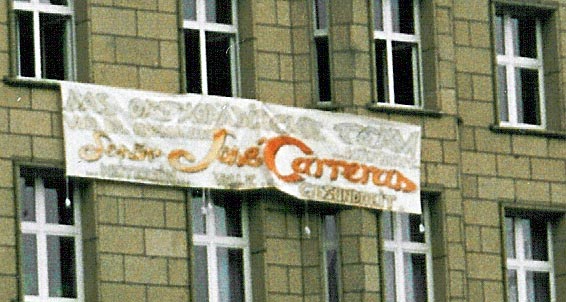
PROGRAM
1. Mozart : Le Nozze di Figaro
2. Tosti: Marechiare JC
3. Tosti: Vieni sul mar JC
4. Le Nozze di Figaro- Voi che sapete AB
5. L'Italiana in Algeri - Pensi alla Patria AB
6. L'Arlesiana - E la solita storia JC
7. Cavalleria Rusticana - Voi che sapete AB
8. Cavalleria Rusticana - Intermezzo
9. Cavalleria Rusticana - Tu qui, Santuzza ABJC
2100-2125
1. Las Bodas de Luis Alonso
2. Me llaman la prima rosa IR
3. Granada JC
4. El duo de la Africana IRJC
5: Carmen - Habanera AB
6. Coren'grato JC
7. O mio babbino caro AB
8. Dein ist mein ganzes Herz JC
9. Die Lustige Witwe - Lippen schweigen ABJC
EXTRA
1. Isabel Rey, koloraturarie
2. Agnes Baltsa, Seguedilla
3. Jose Carreras, O sole mio
4. Baltsa, Carreras, Rey LA TRAVIATA - Brindisi
5. Jose Carreras; O sole mio
Fantastic concert. It was rainy and even some thunder in the second half of the concert.
The concert at Rathausmarkt "Operngala"
18.10. I were at the Rathausmarkt, bought my program, and found my
seat. One could buy Danish dish, a Japanese sushi dish, drink
champagne (of course it wasn't cheap, but almost stylish). I was just
drinking from my bottle of cola-light (big bottle). Not so stylish,
but cheaper!!!
at 20.00
The concert begins, a big applause to the conductor, no, it was
director of the Hamburger Opernwoche. He talks for a short while, then
he gave the word someone import in Hamburg. She talk for a long time,
it seemed. (But in real time the two talked for 10 minutes).
But then David Giménez, came young and fresh and full of energy on the
stage, and we could hear:
Mozart: Le Nozze di Figaro- Ouverture
Splendid delivery of an opera pearl.
J o s e C a r r e r a s came, at everything seemed a l i v e
Tosti: M a r e c h i a r e
Carreras was great, his voice seemed to have been darkening, it had an
almost baritonal flavor. V i e n i s u l m a r
A g n e s B a l t s a
Mozart: Le nozze di Figaro_-V o i c h e s a p e t e
I still gets tears in my eyes when I think of that performance, never
was the aria sung so .... (my words fails me)
Rossini: L'Italiana in Algeri - P e n s a a l l a p a t r i a
She always sings this aria like a goddess. Always when you hear and see
Agnes Baltsa, one is reminded that she can't separate the aria from
the acting, the role, unlike so many other singers, who when it is
concert they don't act.
J o s e C a r r e r a s
Cilea: L'arlesiana _ E l a s o l i t a s t o r i a
Fantastic!!!!!!!!!!!!!!!!!!!
A g n e s B a l t s a
Mascagni: Cavalleria Rusticana - V o i l o s a p e t e , o
m a m m a
Intermezzo (orchestra)
A g n e s B a l t s a & J o s e C a r r e r a s
T u q u i , S a n t u z z a
Great, great, great
End of part 1
----------------------------------------------------------------- Part
2 of the concert.
Resounding in my head was the duet from Cavalleria Rusticana. Nobody
can sing Santuzza like Baltsa, no one can be a better Turriddu than
Carreras. But thinking about it, now, I don't know whether Carreras
has ever sung Turriddu on stage in a opera performance.
It was a 25 minutes break between the two parts of the concert
Agnes Baltsa was wearing a dress, white on the top, and fluffy on the
arms, and the long skirt was black. To get an idea, see:
Baltsa picture.
Isabel Rey was wearing a "turkise" dress. (bleu with green flavor)
Than at 21.25 the concert commences:
Alonso: Las Bodas de Luis Alonso-Intermedio
I s a b e l R e y
Alonso: El Barberillo de Lavapies _ M e l l a m a n l a
p r i m a r o s a
What a joy to hear her fresh and highly individual voice, she doesn't
sound like Caballé, Victoria de los Angeles or Pilar Lorengar, but she
is definitely in their league. A new great Spanish soprano. She have
studied under Montserrat Caballé and Alfredo Kraus, so the program
says.
J o s e C a r r e r a s
Lara: G r a n a d a
naturally the audience goes wild (in the heart, more than action,
maybe it was to hot in Hamburg, I don't know)
C a r r e r a s & R e y
Caballero: EL DUO DE LA AFRICANA
They are acting, they are singing, it is FANTASTIC!!!!!!
A g n e s B a l t s a
Bizet: CARMEN - H a b a n e r a
Great, yes, yes, yes I want to see her as Carmen live on stage
no matter what it costs. How can I say that I have seen Carmen onstage
when she was not the Carmen
J o s e C a r r e r a s
Cardillo: C o r e n ' g r a t o
Jose is just great.
A g n e s B a l t s a
Surprise of the evening:
Puccini:Gianni Schicchi O m i o b a b b i n o c a r o
A mezzo singing one of the great showpiece aria for any young soprano
(like Isabel Rey). With Agnes Baltsa the aria goes further than just
show-piece than just comedy. She gives the aria an touch of tragedy
after all, the soprano is begging her father of getting to marry her
love, if he says no, she will jump into the river Arno.
Wonderfully sung, she ends with a pianissimo.
It is touching, the not so young mezzo, gives away a young woman's
true heart
J o s e C a r r e r a s
Lehar: The land of smiles D e i n i s t m e i n g a n z e s
H e r z
Nobody, even with a better German pronunciation could have sung the
aria better.
B a l t s a & C a r r e r a s
Lehàr Die Lustige Witwe L i p p e n s c h w e i g e n
Great duet from de Merry Widow. one disappointment: Agnes wanted to
waltz, he didn't. But still Fantastic!!!!!!!!!!!!
Extras:
Jose Carreras being the perfect gentleman arranges that I s a b e l
R e y will sing the first extra. He decides which aria she will
sing, gets her laughing yes, and indicating that she knows that aria
perfectly. But I don't .
A g n e s B a l t s a
Bizet: Carmen: S e g u e d i l l a
J o s e C a r r e r a s
O s o l e m i o (or T o r n a a S u r r i e n t o).
Photographs being taking at the same time as we see the heavenly
blitz. Jose loses no nerve.
B a l t s a , C a r r e r a s & R e y
Verdi: La Traviata - B r i n d i s i
Pure heaven
J o s e C a r r e r a s
O s o l e m i o
It was a pure demonstration of strength.
OD Travel
Posted by
operaduets
at
Tuesday, August 22, 2017
0
comments
![]()
Labels: 08_August, 1997, Agnes Baltsa, Baltsa/Carreras, Concert, Germany, Hamburg, Isabel Rey, Josep Carreras
Saturday, June 10, 2017
June 10, 2015: Simon Boccanegra in Hamburg
2015-06-10 Simon Boccanegra (Verdi), Hamburgische Staatsoper
Simon Boccanegra = George Gagnidze
Maria Boccanegra (Amelia) = Barbara Frittoli
Jacopo Fiesco = John Tomlinson
Gabriele Adorno = Giuseppe Filianoti
Paolo Albiani = Robert Bork
Pietro = Alin Anca
Un Capitano dei Balestrieri = Daniel Todd
Un' Ancella di Amelia = Anat Edri
Simone Young, conductor
Philharmoniker Hamburg
Chor der Hamburgischen Staatsoper
INSZENIERUNG: Claus Guth
BÜHNENBILD UND KOSTÜME: Christian Schmidt
LICHT: Wolfgang Göbbel
CHOR: Florian Csizmadia
How are we supposed to understand this opera in this production? Modern costumes but it is not an update really. The people are not modern. We are in Genua at the time of Boccanegra. At the prelude is Simon Boccanegra dead by poison surrounded by his daughter and her husband Gabriele Adorno. And the we go back in time to the Prologue where Simone will become Doge and his Maria is dead...
It is a hard role to play Simon Boccanegra. This time even harder since the director wants us to see it as though Simon is just reliving it with a double playing his part. The double do most of his acting in the room that we are to think is the mirror. In the end the second Boccanegra double is needed too. The singer has to react as though the other person is there in his mind, while the double is the one acting with the other singers. There is an opening in the ceiling for the comet to come clashing down. First we have a whole (prologue), then we the stone in the whole, then half to the floor and in the scene where Boccanegra dies, the stone is on the floor (disaster has struck).
In all the other versions of this opera, Maria Fiesco is in her father's palace, she is sick and in the end dying. Here she is a mother desperate for her child but her father caring is suffocating for her so she escapes her prison by suicide just before her lover coulf rescue her. Fiesco is not a benevolent father here, he is seriously misguided in his "love". Maria, the ghost, lives on. She is on stage, too.
Interaction in this production is often more symbolic than realistic. But all the singers and acters do well. John Tomlinson was Fiesco using his own age also as acting and singing well. George Gagnidze was amazing as Boccanegra. Barbara Frittoli was a great Amelia. Giuseppe Filanoti was a wonderful Gabriele Adorno. And so on.
Simone Young conducted.
Bravi, tutti!
OD Travel & Photos
Original blog post
For more reviews from my travels, see www.operaduetstravel.com If you want to see more photos from my OperaDuets Travels, go to www.operaduetsphotos.com
Posted by
operaduets
at
Saturday, June 10, 2017
0
comments
![]()
Labels: 06_June, 2015, Barbara Frittoli, George Gadnidze, Germany, Giuseppe Filianoti, GIUSEPPE VERDI, Hamburg, John Tomlinson, Opera, SIMON BOCCANEGRA
Monday, June 5, 2017
June 5, 2004: Otello in Hamburg
2004-06-05 Otello (Verdi), Hamburgische Staatsoper
Otello = José Cura
Desdemona = Barbara Frittoli
Jago = Lado Ataneli
Emilia = Yvi Jänicke
Cassio = Peter Galliard
Rodrigo = Ho-yoon Chung
Lodovico = Alexander Tsymbalyuk
Montano = Carl Schultz
Herold = Moritz Gogg
Philippe Auguin, conductor
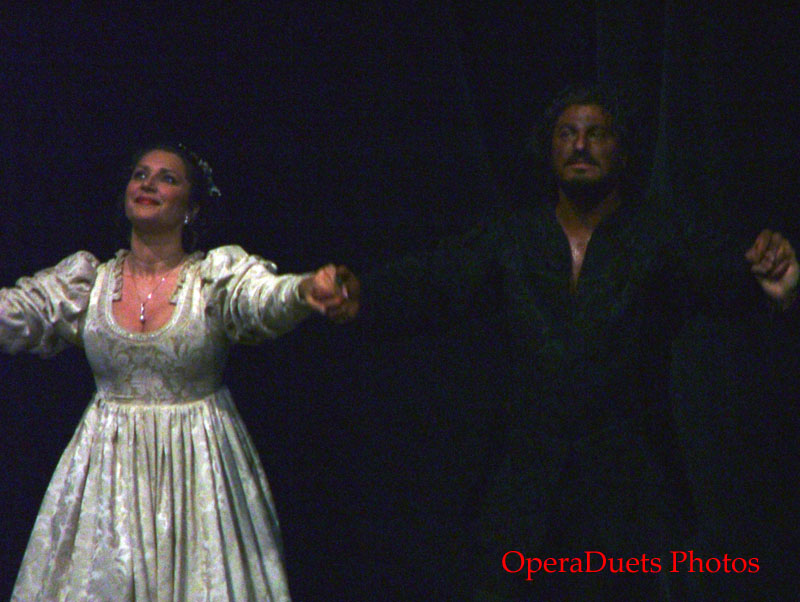
Chorus: Florian Csizmadia
5.6. Shopping in Hamburg, finding out where to go. Following the crowd most of the time. And then it was opera-time. This time was a better Otello performance. From the first note of the orchestra I knew it would be great. The orchestra and chorus was together. I thought that all the singers was better. It was really dramatic and wonderful. None of the former critical remarks of this production bothered me. And audience was totally committed to applauds and Bravos, and the singers seemed forever to go out and great the applauds.
And I saw Lado Anteli and Jose Cura afterwards and got some nice photos of them. And then 25(?) JCx-members enjoyed Restaurant Opera until it was 0130.
OD Travel + Photos
Posted by
operaduets
at
Monday, June 05, 2017
0
comments
![]()
Labels: 06_June, 2004, Barbara Frittoli, Germany, GIUSEPPE VERDI, Hamburg, José Cura, Lado Ataneli, Opera, OTELLO
Sunday, June 4, 2017
June 4, 2016: La Fanciulla del West in Hamburg
2016-06-04 La Fanciulla del West (G. Puccini), Hamburgische Staatsoper
Dick Johnson (Ramirez) = José Cura
Minnie = Amarilli Nizza
Jack Rance = Claudio Sgura
Harry = Benjamin Popson
Jake Wallace = Stanislav Sergeev
Nick = Jürgen Sacher
Ashby = Tigran Martirossian
Sonora = Kartal Karagedik
Sid = Alexey Bogdanchikov
Trin = N.N.
Bello = Viktor Rud
Joe = Daniel Todd
Happy = Zak Kariithi
Harry = Benjamin Popson
José Castro = N.N.
Larkens = Alin Anca
Billy Jackrabbit = Bruno Vargas
Wowkle = Marta Swiderska
Un Postilione = N.N.
Josep Caballé-Domenech, conductor
Philharmonisches Staatsorchester Hamburg
Chor der Hamburgischen Staatsoper
Inszenierung: Vincent Boussard
Bühnenbild: Vincent Lemaire
Kostüme: Christian Lacroix
Licht: Guido Levi
It was Jose Cura's Day.
Some people disagree with me but this was the best Fanciulla del West for me, anyway.
This was the performance where I was never bored. I think the orchestra and the conductor did a fine job at least when I was the on June 4th, 2016. I loved Amarilli Nizza as Minnie. I found her absolutely right. She was the perfect Minnie. Jose Cura did one of his best Dick Johnson. Claudio Sgura was a great Jack Rance. The only thing about Jack Rance was that the director seemed to have had less thought about this important role in La Fanciulla del West than he used when thinking out the singer Jack Wallace. The director made Jack Wallace into a blonde but male Marilyn Monroe clone. What a stupid and useless idea that was! Putting Marilyn Monroe into an actual gold-mine, whoops.
I loved it. It was believable except for Marilyn Monroe, the canary in a gold-mine. The kiss in second act with the curtain coming down, it was snowing, a snow storm outside, and then curtain up and wow, suddenly a few seconds in real time could have been hours together with Dick doing more than just kissing Minnie. That was elegantly done. The sets was used in the best manner in this opera production. And even the 3rd act was well done. Bravi, tutti!
I must apologize to Marilyn Monroe: Sorry but you are still the icon to be used and abused and this time they did it as they were still in kindergarten. Buh!
For more reviews from my travels, see www.operaduetstravel.com If you want to see more photos from my OperaDuets Travels, go to www.operaduetsphotos.com
Posted by
operaduets
at
Sunday, June 04, 2017
0
comments
![]()
Labels: 05_May, 06-04, 2016, Amarilli Nizza, Claudio Sgura, FANCIULLA DEL WEST, Germany, GIACOMO PUCCINI, Hamburg, José Cura
Monday, May 29, 2017
May 29, 2004: Otello in Hamburg
2004-05-29 Otello (Verdi), Hamburgische Staatsoper
Otello = José Cura
Desdemona = Barbara Frittoli
Jago = Lado Ataneli
Emilia = Yvi Jänicke
Cassio = Peter Galliard
Rodrigo = Ho-yoon Chung
Lodovico = Alexander Tsymbalyuk
Montano = Carl Schultz
Herold = Moritz Gogg
Philippe Auguin, conductor
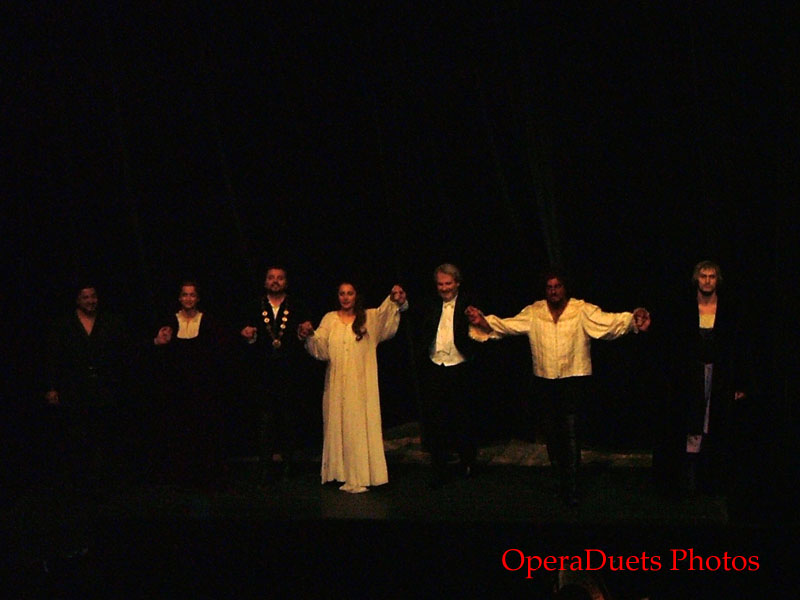
Chorus: Florian Csizmadia
Otello (G. Verdi) 1930. Jose Cura, Barbara Frittoli and Lado Ataneli.
Act 1 The conductor was Philippe Auguin. From the first note of Otello I was disappointed. I blame the conductor. The musical dynamics was missing. All emotions and situations on the stage was conducted alike. The orchestra was loud and quiet, loud and quiet without any musical reason. The chorus suffered and the principals suffered too. Otello's "Esultate!" came to me as a three-parted voice of Cura, it was not together. I missed a greater scene-presence when Lado Ataneli sang, he sang well, but lacked the zeal of Ruggero Raimondi. The love duet was wonderfully sung and acted by Cura & Frittoli. Because of the slow tempi when BF sang Amen in "Amen risponda" she had trouble getting her full voice in specifically in the "A---men". The act ended with the couple on the beach, with the pier and and the red full moon behind them
Act 2. Jago's Credo was wonderfully sung by Lado Ataneli, but the menace that Ruggero Raimondi had was not there, I missed that. The beautiful quartet ended act 2, but it had couple of inaccuracies in timing, or rather almost inaccuracies. (forgot: that after the quartet followed "Tu, indietro!", and narrating the "dream" that he says Cassio had, and of course, "Si pel ciel marmoreo giuro")
First real intermission between act 2 & 3.
Act 3. The action in on the stairs of the castle. It was all truly great. For me the only thing is that I found that Otello was falling down too many times for me. But the singing and acting of Jose Cura was a first class act. BRAVO, CURA!
Act 4. Barbara Frittoli is a great Desdemona. The idea of seeing the wind blow in the curtains (we could actually see that there were hands moving the white curtains) was rather stupid, I find. It was not necessary at the beginning of first act and not even when Emilia sang "E il vento!" (It's the wind) was it necessary, the audience is not stupid. Then Otello, Jose Cura, came. The tension is high, and they are just great, Cura & Frittoli. But when Emilia cries Murder so very few comes, just the key players, and before Cura sings "Niun mi tema" they are gone, only the dead Desdemona and Otello is left on stage. "Niun mi tema" - "Nobody be afraid", but there is nobody there!? And when Otello sing "Un bacio!" and the music reminiscence of the love duet in act 1, the stage darkens, and we see the pier and the full moon of act 1. Cute, but we are not stupid. The Music tells it all much better.
After the opera a lot of JCx is waiting for Cura to come backstage, Lado comes first, then it is finally Cura. And when the crowd is satisfied. Ten JCx ends the day in the restaurant Opera with a drink and some salad.
At 0100 in bed.
OD Travel + Photos
Posted by
operaduets
at
Monday, May 29, 2017
0
comments
![]()
Labels: 05_May, 2004, Barbara Frittoli, Germany, GIUSEPPE VERDI, Hamburg, José Cura, Lado Ataneli, Opera, OTELLO
